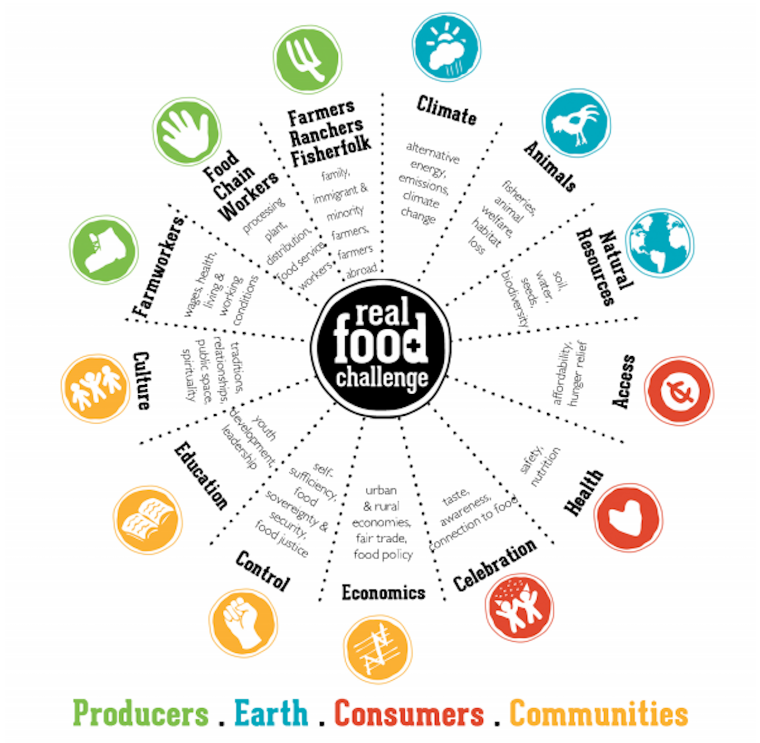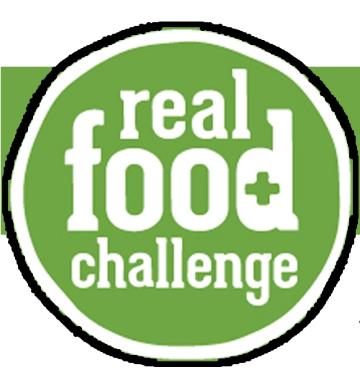The Real Food Challenge is a sustainable food movement that works to bring positive change to the food industry by supporting sustainable food options at Colleges and Universities across the nation. Real Food combines environmentalism, public health, and social justice in effort to define what it means to be "Real Food." The Real Food Challenge has an extensive set of standards by which food products can qualify as Real Food. These standards work to ensure that Real Food is humane, locally sourced, ecologically sustainable, socially fair. To learn more about the Challenge nationwide, visit RealFoodChallenge.org.

At Santa Clara University (SCU), the Real Food Challenge is led by students who are supported by the Center for Sustainability and Auxiliary Services/ Dining Services. By promoting, seeking, and consuming Real Food, students at SCU can help to promote social justice values and humane production practices, better their own personal health, protect our environment, and ensure a more sustainable future.
As a Jesuit institution, Santa Clara University and its students are guided by a set of underlying Jesuit values that promote social justice. These values are incorporated into the educational material of all classes taught at SCU. As a result of this, the students of SCU are familiar and accepting of social justice values. This principle of social justice is a core element of the Real Food Challenge. The shared values that exist between the Real Food Challenge and the SCU community are clearly evident in these socially just and humane values.
Another clear parallel between the values of Real Food and the values of the SCU community is the value of student health. Although not specifically outlined in the standards for Real Food, food that has met the criteria to be certified as Real Food comes with inherent health benefits. Food products that come from ecologically sound and local production processes provide more nutrients to the consumer without the risk of pesticides or other ills that are associated with the industrial agriculture industry.
The Real Food Challenge also connects with the values of the SCU community in its promotion of ecologically sound and sustainable food products. SCU's Center for Sustainability has made significant strides in leading SCU down a path towards an ever more sustainable future as a University. Santa Clara University students can help make SCU a more sustainable campus by simple seeking out and consuming Real Food products when eating meals on campus. Consuming Real Food is a simple and easy way to promote sustainability and contribute to the health of our environment.
View directly, or right-click to save a copy.
The Real Food Challenge made its way to Santa Clara University in 2012. An SCU student, named Amelia Evans, received a Jean Donovan Summer Fellowship to research SCU’s procurement practices and see what percentage of it consisted of certified Real Food. She collaborated with a student organization, which is now known as ENACT, for this research. She looked at invoices for the school’s purchases for that year and constructed a report showing that our school’s percentage of Real Food purchasing was estimated at 19%. Evans met with the school’s president at the time, Fr. Michael Engh, S.J., and shortly after, the school pledged to reach 20% Real Food by 2020. SCU was then registered as a Real Food campus.
The Real Food Challenge emphasizes the importance of the movement to being a student-led initiative. Building upon this, Real Food certification requires that students take a central role in the development of the movement on each campus as well as the research involved with certifying a campus as a Real Food campus. SCU was registered for the first time as a Real Food campus in 2012, yet there was a lapse in SCU’s Real Food registration due to the fact that no student researchers were leading the project or conducting the research that would be necessary for certification. This lapse has since been corrected and SCU has restored its status as a Real Food campus.
In 2015, the lapse came to an end when another student research team investigated the school’s procurement practices. This three student team took on the research for the Real Food Challenge as a part of their Senior Capstone Project and issued a report with their findings. However, the research required to conduct the Real Food Challenge was yet to be solidified as a yearly practice and SCU fell into another two-year lapse in Real Food registration. In response to the need for students to research and report on SCU’s Real Food procurement levels, SCU’s Auxiliary Dining Services and The Center for Sustainability teamed up to secure a fellowship that allows two student researchers to be paid each year to complete the research needed for the Real Food Challenge. With the implementation of this fellowship program, SCU is expected to have students conducting and reporting research about Real Food on campus for the foreseeable future.
